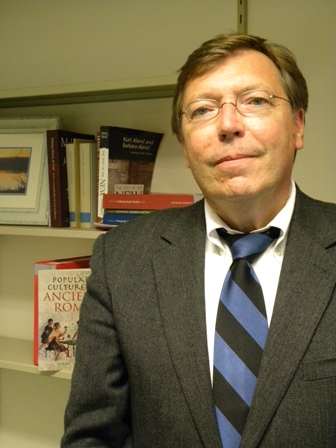By Samantha Franco

Fordham Theology professor Larry Welborn absorbs life through reading academic texts and interacting with his students and fellow faculty members. He loves to research, teach and inspire. However, how can one teach the subject they adore when they have declining vision? How can one read, write or interact with others on a daily basis when they can barely see? These are the types of questions that haunted Fordham professor Welborn when he lost his vision in fall 2013.
“When you make your living by reading, writing and teaching, the idea that you might lose your eyesight is very frightening,” said Welborn.
In October 2013, Professor Welborn was sailing with his wife at the Yale Club on New York Harbor when he began to realize that his field of vision in his right eye was going dark.
After a few days had passed with no results in sight, he went to an ophthalmologist who immediately put him into emergency surgery. The ophthalmologist then told him that he had suffered a large tear in the retina of his right eye. By the beginning of his surgery, half of the vision in Professor Welborn’s right eye was gone.
The recovery process took eight weeks, including a prescription to lay in a face down posture. Due to the surgery, Welborn was unable to resume teaching; so the Theology Department Chair Patrick Hornback petitioned the Dean of Faculty of Arts and Sciences John Harrington for Welborn to be placed on medical leave, which was granted immediately to him.
Welborn returned to Fordham in December 2013 still recovering from his surgery, but able to teach. His recovery lasted through the spring semester of 2014. By the beginning of the fall semester, however, he began to notice yet another decline in vision, this time in his left eye. His students noticed as well and brought it to the attention of the theology department, who told Welborn to visit a doctor.
He decided to see a retinal specialist in New York City, who told him he would need another two surgeries to rectify the rapidly growing problem in his left eye. Originally, Welborn was scheduled for a faculty fellowship in the spring of 2015, which is the period of time granted to a professor for them to do research and compile his findings. However, the Provost Stephen Freedman granted him another medical leave to preserve his faculty fellowship for the future.
On Feb. 20, 2015, Welborn underwent his second surgery, which also had an eight-week recovery period.
On Sept. 1, he went through his third surgery to remove a cataract that had developed as a result of the previous one.
“It was a shock and surprise [that this happened] because no one in my family history had ever had this problem before,” Welborn said.
Since his vision improved, Professor Welborn has been able to return to life as normal. He can legally drive again, instead of having his wife and sons drive him around for his errands. He also utilized his time to publish many works. During his recovery period, Professor Welborn published a monograph on May 1 with Columbia University Press, published another book on Sept. 15 and finished three chapters of his upcoming book.
Currently, Welborn is working on his faculty fellowship for the fall semester. He travelled to Amsterdam this past July, in between surgeries, to talk about one of his major papers at an academic conference, where he was asked by two publishers to publish a book based on his paper. His paper is about the generational conflicts in the Greek and Roman world in early Christianity, which he says is still relevant today because economic recessions have caused unemployment for the younger generations, creating conflict between the young and the old. He has been working since August to expand the paper into a book. He hopes to finish the book by November so he can return to Fordham by next semester.
“I am eager to come back to campus in January because I miss my students and fellow faculty members,” Welborn said. “After each one of the surgeries, colleagues at Fordham called me and my wife to see how things are going to express support. I can’t imagine many universities where that sort of humanity and caring is shown to employees. And that experience goes all the way from the top of the university down.”







































































































































































































